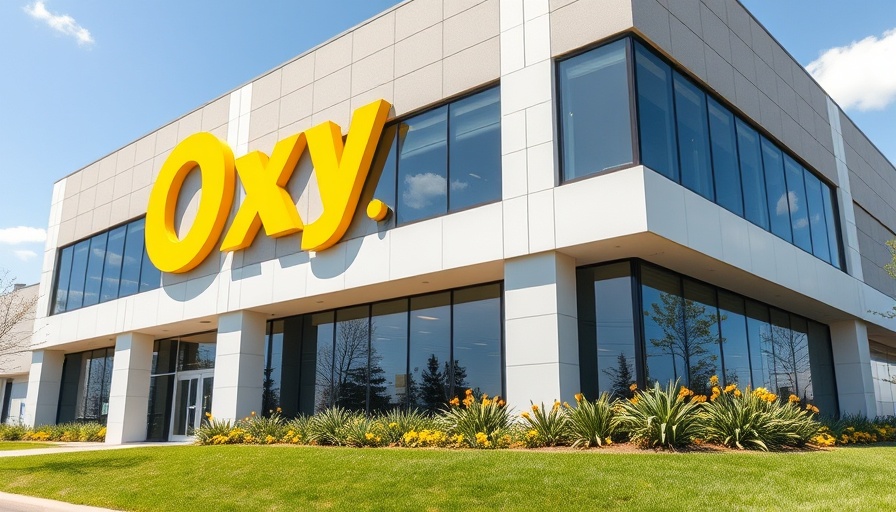
Occidental's Strategic Acquisition: A Shift in Carbon Management
In a significant move, Occidental Petroleum has acquired Holocene, a startup specializing in innovative carbon removal technologies, through its subsidiary Oxy Low Carbon Ventures. This acquisition marks another step in Occidental's strategy to deepen its capabilities in direct air capture (DAC), a technology aimed at removing carbon dioxide from the atmosphere. With this latest deal, Occidental continues to invest heavily in tools that may help mitigate climate change while simultaneously bolstering its own oil production techniques.
Why Now? The Importance of Carbon Removal Technologies
The urgency to address climate change has prompted increased interest in carbon removal solutions, particularly as countries strive to meet emissions reduction targets agreed upon in international climate accords. Holocene's technology is appealing largely due to its cost-effectiveness; at about $100 per metric ton of carbon removed, it promises significant savings compared to the projected $600 per ton for other existing methods. By acquiring Holocene, Occidental not only gains access to groundbreaking technology but also positions itself advantageously within the evolving landscape of carbon management.
How Direct Air Capture Fits into the Future of Fossil Fuels
Occidental is not new to the realm of carbon capture. The company previously purchased Carbon Engineering, another DAC startup, for a whopping $1.1 billion. This consolidation in the sector suggests that Occidental is banking on carbon capture not just as an environmental initiative but as a crucial element of its business model, particularly as enhanced oil recovery methods become increasingly reliant on CO2 injections. The company sees DAC technologies as a means of making its operations compatible with regulatory demands and market pressures favoring sustainability.
Navigating the Regulatory Landscape: Financial Incentives for Carbon Capture
The financial ramifications of the Inflation Reduction Act (IRA) may also be driving Occidental's investment strategy. Enhanced carbon capture technologies qualify for tax credits, with incentives varying based on energy sources used in the capture process. For Occidental, employing Holocene's solutions not only enhances corporate responsibility but could also yield substantial fiscal benefits, leading to greater profits aligned with sustainability goals.
Broader Implications: What This Means for the Energy Sector
This acquisition highlights a growing trend among fossil fuel companies to adapt to the low-carbon economy landscape. As regulatory environments tighten and consumer preferences shift toward sustainability, it is likely we will see more traditional energy companies pursuing technology-driven solutions for cleaner practices. Moreover, startups like Holocene could serve as innovative partners, providing the expertise necessary to facilitate this transition.
Potential Pitfalls in Corporate Sustainability Initiatives
However, the merging of startups focused on sustainability with major fossil fuel companies raises critical questions. Critics argue that such acquisitions might result in greenwashing, where companies market themselves as environmentally friendly without making substantial changes to their core operations. Transparency in how acquired technologies are implemented will be critical in measuring the authenticity of these initiatives and whether they genuinely contribute to climate change mitigation.
Future Innovations: Looking Ahead in Carbon Management
Looking to the future, the implications of such transactions could pave the way for further innovations and partnerships in the carbon management sector. With the continuous emergence of new technologies aimed at reducing greenhouse gases, other companies will likely follow Occidental’s lead towards strategic acquisitions to bolster their operational sustainability. The integration of state-of-the-art solutions like those from Holocene will be vital in deriving effective strategies to combat climate change while keeping the economy afloat.
Conclusion: Balancing Profits and Planet
As Occidental asserts itself in the carbon capture market, the ongoing interplay between technological advancement and environmental responsibility is set to inform corporate strategies across the energy sector. While the acquisition of Holocene positions Occidental advantageously within a competitive landscape, the broader implications remain to be seen. Will these investments yield real improvements in environmental health, or will they merely serve as another chapter in the narrative of corporate sustainability amidst a backdrop of fossil fuel dependency?
 Add Row
Add Row  Add
Add 



Write A Comment